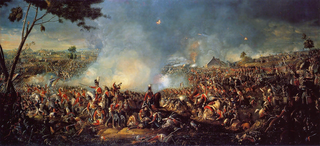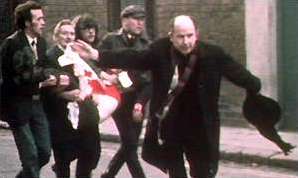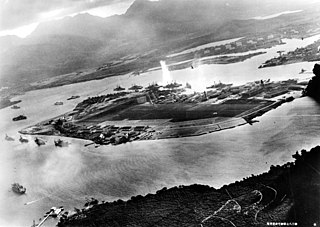
The Auschwitz concentration camp was a complex of over 40 concentration and extermination camps built and operated by Nazi Germany in occupied Poland during World War II and the Holocaust. It consisted of Auschwitz I, the main camp (Stammlager) and administrative headquarters, in Oświęcim; Auschwitz II–Birkenau, a combined concentration/extermination camp three kilometers away in Brzezinka; Auschwitz III–Monowitz, a labor camp seven kilometers from Auschwitz I, set up to staff an IG Farben synthetic-rubber factory; and dozens of other subcamps.

The Battle of Waterloo was fought on Sunday, 18 June 1815 near Waterloo in Belgium, part of the United Kingdom of the Netherlands at the time. A French army under the command of Napoleon Bonaparte was defeated by two of the armies of the Seventh Coalition: a British-led allied army under the command of the Duke of Wellington, and a Prussian army under the command of Field Marshal Blücher. The battle marked the end of the Napoleonic Wars.

Bloody Sunday, sometimes called the Bogside Massacre, was an incident on 30 January 1972 in the Bogside area of Derry, Northern Ireland, when British soldiers shot 28 unarmed civilians during a protest march against internment. Fourteen people died: thirteen were killed outright, while the death of another man four months later was attributed to his injuries. Many of the victims were shot while fleeing from the soldiers and some were shot while trying to help the wounded. Other protesters were injured by rubber bullets or batons, and two were run down by army vehicles. The march had been organised by the Northern Ireland Civil Rights Association (NICRA). The soldiers involved were members of the 1st Battalion, Parachute Regiment, also known as "1 Para".

The Industrial Revolution was the transition to new manufacturing processes in Europe and the US, in the period from about 1760 to sometime between 1820 and 1840. This transition included going from hand production methods to machines, new chemical manufacturing and iron production processes, the increasing use of steam power and water power, the development of machine tools and the rise of the mechanized factory system. The Industrial Revolution also led to an unprecedented rise in the rate of population growth.

A lesbian is a homosexual woman. The word lesbian is also used for women in relation to their sexual identity or sexual behavior regardless of sexual orientation, or as an adjective to characterize or associate nouns with female homosexuality or same-sex attraction.

Nazi Germany is the common English name for Germany between 1933 and 1945, when Adolf Hitler and his Nazi Party (NSDAP) controlled the country through a dictatorship. Under Hitler's rule, Germany was transformed into a totalitarian state that controlled nearly all aspects of life via the Gleichschaltung legal process. The official name of the state was Deutsches Reich until 1943 and Großdeutsches Reich from 1943 to 1945. Nazi Germany is also known as the Third Reich, meaning "Third Realm" or "Third Empire", the first two being the Holy Roman Empire (800–1806) and the German Empire (1871–1918). The Nazi regime ended after the Allies defeated Germany in May 1945, ending World War II in Europe.

The Qing dynasty, officially the Great Qing, was the last imperial dynasty of China. It was established in 1636, and ruled China proper from 1644 to 1912. It was preceded by the Ming dynasty and succeeded by the Republic of China. The Qing multi-cultural empire lasted for almost three centuries and formed the territorial base for modern China. It was the fifth largest empire in world history. The dynasty was founded by the Manchu Aisin Gioro clan in Manchuria. In the late sixteenth century, Nurhaci, originally a Ming Jianzhou Guard vassal, began organizing "Banners", military-social units that included Manchu, Han, and Mongol elements. Nurhaci formed the Manchu clans into a unified entity. By 1636, his son Hong Taiji began driving Ming forces out of the Liaodong Peninsula and declared a new dynasty, the Qing.

The Thirteen Colonies, also known as the Thirteen British Colonies or Thirteen American Colonies, were a group of British colonies on the Atlantic coast of North America founded in the 17th and 18th centuries. They declared independence in 1776 and formed the United States of America. The Thirteen Colonies had very similar political, constitutional, and legal systems and were dominated by Protestant English-speakers. They were part of Britain's possessions in the New World, which also included colonies in Canada, the Caribbean, and the Floridas.

The Second Boer War was fought between the British Empire and two Boer states, the South African Republic and the Orange Free State, over the Empire's influence in South Africa. It is also known variously as the Boer War, Anglo-Boer War, or South African War. Initial Boer attacks were successful, and although British reinforcements later reversed these, the war continued for years with Boer guerrilla warfare, until harsh British counter-measures brought them to terms.

The 1989 Tiananmen Square protests, commonly known in mainland China as the June Fourth Incident, were student-led demonstrations in Beijing in 1989. More broadly, it refers to the popular national movement inspired by the Beijing protests during that period, sometimes called the '89 Democracy Movement. The protests were forcibly suppressed after Chinese Premier Li Peng declared martial law. In what became known in the West as the Tiananmen Square Massacre, troops with assault rifles and tanks fired at the demonstrators trying to block the military's advance towards Tiananmen Square. The number of civilian deaths was internally estimated by the Chinese government to be near or above 10,000.

The Cultural Revolution, formally the Great Proletarian Cultural Revolution, was a sociopolitical movement in China from 1966 until 1976. Launched by Mao Zedong, then Chairman of the Communist Party of China, its stated goal was to preserve Chinese Communism by purging remnants of capitalist and traditional elements from Chinese society, and to re-impose Mao Zedong Thought as the dominant ideology within the Party. The Revolution marked Mao's return to a position of power after the failures of his Great Leap Forward. The movement paralyzed China politically and negatively affected both the economy and society of the country to a significant degree.

The Colosseum or Coliseum, also known as the Flavian Amphitheatre, is an oval amphitheatre in the centre of the city of Rome, Italy. Built of travertine, tuff, and brick-faced concrete, it is the largest amphitheatre ever built. The Colosseum is situated just east of the Roman Forum. Construction began under the emperor Vespasian in AD 72, and was completed in AD 80 under his successor and heir Titus. Further modifications were made during the reign of Domitian (81–96). These three emperors are known as the Flavian dynasty, and the amphitheatre was named in Latin for its association with their family name (Flavius).

The Attack on Pearl Harbor was a surprise military strike by the Imperial Japanese Navy Air Service against the United States naval base at Pearl Harbor, Hawaii Territory, on Sunday morning, December 7, 1941. The attack, also known as the Battle of Pearl Harbor, led to the United States' formal entry into World War II. The Japanese military leadership referred to the attack as the Hawaii Operation and Operation AI, and as Operation Z during its planning.

The Battle of Midway was a decisive naval battle in the Pacific Theater of World War II that took place between 4 and 7 June 1942, only six months after Japan's attack on Pearl Harbor and one month after the Battle of the Coral Sea. The United States Navy under Admirals Chester Nimitz, Frank Jack Fletcher, and Raymond A. Spruance defeated an attacking fleet of the Imperial Japanese Navy under Admirals Isoroku Yamamoto, Chūichi Nagumo, and Nobutake Kondō near Midway Atoll, inflicting devastating damage on the Japanese fleet that proved irreparable. Military historian John Keegan called it "the most stunning and decisive blow in the history of naval warfare".

Black-and-white images combine black and white in a continuous spectrum, producing a range of shades of gray.

My Little Pony is a toy line and media franchise mainly targeting girls, developed by American toy company Hasbro. The first toys were developed by Bonnie Zacherle, Charles Muenchinger, and Steve D'Aguanno, and were produced in 1981. The ponies feature colorful bodies, manes and a unique symbol on one or both sides of their flanks. Such symbols are referred to in the two most recent incarnations as "cutie marks". My Little Pony has been revamped several times with new and more modern looks to appeal to a new market.

The Indian Rebellion of 1857 was a major, but ultimately unsuccessful, uprising in India in 1857–58 against the rule of the British East India Company, which functioned as a sovereign power on behalf of the British Crown. The rebellion began on 10 May 1857 in the form of a mutiny of sepoys of the Company's army in the garrison town of Meerut, 40 miles northeast of Delhi. It then erupted into other mutinies and civilian rebellions chiefly in the upper Gangetic plain and central India, though incidents of revolt also occurred farther north and east. The rebellion posed a considerable threat to British power in that region, and was contained only with the rebels' defeat in Gwalior on 20 June 1858. On 1 November 1858, the British granted amnesty to all rebels not involved in murder, though they did not declare the hostilities formally to have ended until 8 July 1859. The rebellion is known by many names, including the Sepoy Mutiny, the Indian Mutiny, the Great Rebellion, the Revolt of 1857, the Indian Insurrection, and the First War of Independence.

Apartheid was a system of institutionalised racial segregation that existed in South Africa from 1948 until the early 1990s. Apartheid was characterised by an authoritarian political culture based on baasskap, which encouraged state repression of Black African, Coloured, and Asian South Africans for the benefit of the nation's minority white population. The economic legacy and social effects of apartheid continue to the present day.

RMS Titanic was a British passenger liner that sank in the North Atlantic Ocean in 1912, after colliding with an iceberg during her maiden voyage from Southampton to New York City. Of the estimated 2,224 passengers and crew aboard, more than 1,500 died, making it one of modern history's deadliest commercial marine disasters during peacetime. RMS Titanic was the largest ship afloat at the time she entered service and was the second of three Olympic-class ocean liners operated by the White Star Line. She was built by the Harland and Wolff shipyard in Belfast. Thomas Andrews, chief naval architect of the shipyard at the time, died in the disaster.

The Battle of Baghuz Fawqani is an offensive by the Kurdish-led Syrian Democratic Forces (SDF), assisted by American-led coalition airstrikes, artillery, and special forces personnel, that began on 9 February 2019 as part of the Deir ez-Zor campaign of the Syrian Civil War. The battle, composed of a series of ground assaults, is taking place in and around the Syrian town of Al-Baghuz Fawqani in the Middle Euphrates River Valley near the Iraq-Syria border and is regarded as the territorial last stand of the Islamic State of Iraq and the Levant (ISIL) in eastern Syria.





















